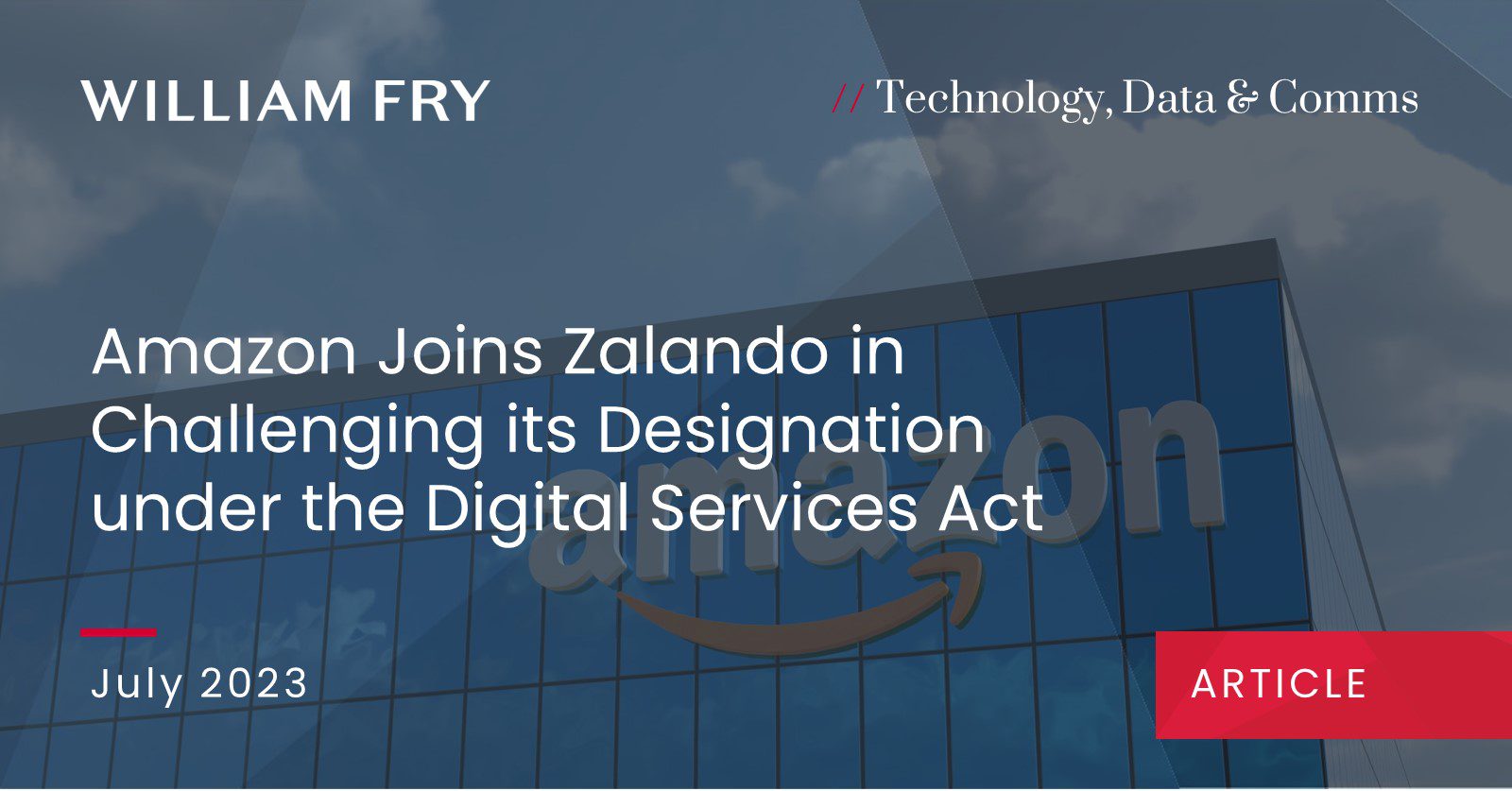Amazon is the second company to challenge its designation under the DSA, following a similar challenge launched by German online retailer Zalando last month.
On 11 July 2023, Amazon filed a legal challenge against the European Commission’s (Commission) decision to designate its platform as a “Very Large Online Platform” (VLOP) under the new Digital Services Act (DSA) – the EU’s flagship law to combat illegal content online
As discussed previously here, the Commission has designated 19 companies, including Amazon and Zalando, as operating either a VLOP or its search engine equivalent, a “Very Large Online Search Engine” (VLOSE). Designation as a VLOP or VLOSE means that these platforms are deemed to be of “systemic” importance and expose the companies which operate them to a strict new regulatory regime.
Amazon and Zalando’s legal challenges raise significant questions about the scope of the DSA, particularly as it relates to online retailers.
What is a VLOP, and why does it matter?
Under the DSA, a VLOP is an online platform with 45 million or more average monthly active users in the EU and is designated as such by the Commission in a formal decision under Article 33 of the DSA.
VLOPs have wide-ranging obligations under the DSA to manage and mitigate systemic risks. Some of the more substantial obligations the DSA places on VLOPs include the following:
- Conducting annual risk assessments and putting in place measures to mitigate various risks, including the dissemination of illegal content online.
- Ensuring enhanced advertising transparency by publishing repositories of information on all the advertisements on their interface.
- Carrying out annual independent audits at their own expense to ensure compliance with the DSA.
- Establishing an independent compliance function within their organisation, which will report directly to the organisation’s board.
- Providing regulators with access to all data necessary to assess compliance with the DSA.
- Implementing crisis response mechanisms and adhering to guidance issued by the Commission concerning specific actions on content during social and political emergencies.
Basis of Amazon’s Legal Challenge
In its legal challenge, Amazon contends that it has been “unfairly singled out” as none of the largest retailers in any of the EU member states in which it operates has been similarly designated as a VLOP.
“If the VLOP designation were to be applied to Amazon and not to other large retailers across the EU, Amazon would be unfairly singled out and forced to meet onerous administrative obligations that don’t benefit EU consumers”, a company spokesperson told Reuters.
However, Amazon’s statement to the media suggests that the company also intends to make more fundamental arguments around the objectives of the DSA.
“The DSA was designed to address systemic risks posed by very large companies with advertising as their primary revenue and that distribute speech and information…. Amazon doesn’t fit this description of a ‘Very Large Online Platform’ (VLOP) under the DSA and therefore should not be designated as such.”
Amazon’s challenge comes just weeks after German online retailer Zalando pursued a similar legal action challenging its designation as a VLOP. Like Amazon, Zalando argued that the predominantly retail nature of its business model means that it does not pose a risk in terms of spreading harmful or illegal content from third parties. Zalando also challenged what it alleges are inconsistencies in the methodology applied by the Commission in calculating platforms’ user numbers which, it argues, has led to the Commission significantly overestimating its number of active EU users.
The Commission has taken note of Amazon’s challenge and has stated that it will defend its position in court. Commenting on the scope of the DSA, a spokesperson stated that it “is very clear and is defined to cover all platforms that expose their users to content, including the sale of products or services, which can be illegal. For marketplaces as for social networks, very wide user reach increases the risks and the platforms’ responsibilities to address them”.
These two challenges will be closely watched, particularly by similar ecommerce platforms and other large and growing platforms with a presence in the EU market.
Impact for Businesses
As matters stand, those entities designated as VLOPs must be prepared to comply with the relevant obligations by next month. This leaves a short window for the European General Court to issue its determination on Amazon and Zalando’s legal challenges, and an even shorter window for the companies to comply with the DSA if their designation is upheld. We will be monitoring these cases closely over the next few weeks.
In the meantime, if you have any queries about this development or the DSA in general, please contact David Kirton, Leo Moore, or your usual William Fry contact.
Contributed by Sophie Jones




